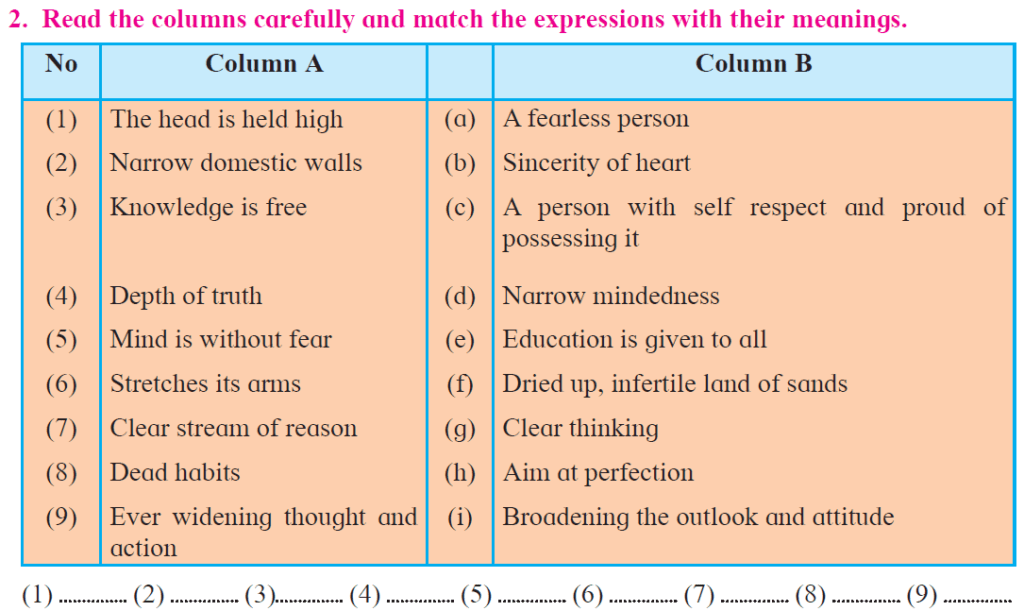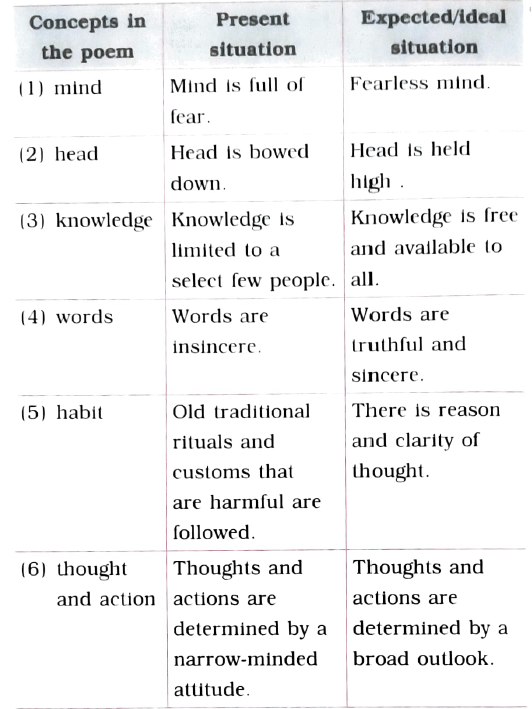
(Rabindranath Tagore (1861-1941) was the author of Gitanjali and its ‘profoundly sensitive, fresh and beautiful verse’. He became the first non-European to win the Nobel Prize in Literature in 1913. This poem is one of his vastly read and discussed poems. It was originally composed in Bengali and later he himself translated it into English. This poem is from his Nobel Prize-winning anthology ‘Gitanjali’. Tagore lived during the time when India was ruled by the British. In this poem, besides political freedom from the British, Tagore also appeals to God for social, educational, and economic freedom for the people of India.
Where the mind is without fear and the head is held high
Where knowledge is free
Where the world has not been broken up into fragments
By narrow domestic walls
Where words come out from the depth of truth
Where tireless striving stretches its arms towards perfection
Where the clear stream of reason has not lost its way
Into the dreary desert sand of dead habit
Where the mind is led forward by Thee
Into ever-widening thought and action
Into that heaven of freedom, my Father, let my country awake.
– Rabindranath Tagore
Introduction:
This famous poem by Rabindranath Tagore. It was written when India was under the British Rule. The poem is written in the form of a prayer to the Almighty asking for freedom for the country.
Tagore also appeals to God for social, educational, and economic freedom for the people of India. The poem was originally composed in Bengali. Tagore won the Nobel Prize for Literature in 1913, and this poem appeared in his Nobel Prize-winning anthology Gitanjali.
PARAPHRASE
Rabindranath Tagore wishes his country to get true freedom, and he describes what this heaven of freedom is. He begins by saying that the minds of his countrymen should be free from any fear and there should be free, and everyone should be allowed to acquire knowledge.
People should be united and the world should not be broken up into small pieces. There should be no division of people based on religion, caste, creed, colour, race, or any other such prejudices, not only in our own society but in the countries of the world as well.
The poet wants a country where people speak the truth sincerely, with the words coming from the depth of their hearts. Everyone should work hard to reach their goal, and they should continuously strive toward perfection.
He then compares logical thinking, or reason, to a clear stream, and old traditional rituals and customs that are harmful to the dreary desert sand of dead habit. He says that the reasoning ability of people should not be lost or overshadowed by superstitious beliefs and prejudices
Let his countrymen should be led by rational thinking and not by any old beliefs that are In lines 9 and 10, the poet wants the minds of his countrymen to be led forward by the Almighty so that they broaden their outlook, and thoughts, and actions. He means that we should be generous in thought and open-minded.
In the last line, the poet addresses God as ‘my Father and asks Him to awaken his country into heaven of freedom, where there is total freedom of good thoughts, good words, and good actions.
Margin Questions:
- What does the poet pray to the Almighty for?
Ans: The poet prays to the Almighty asking Him to awaken his country into heaven of freedom. Where the people are all truly free and total freedom of good thoughts, good words and good actions exists, while respecting those of others.
- What are ‘reason’ and ‘dead habit’ compared to?
Ans: Reason’ is compared to a clear stream, and dead habit’ is compared to the dreary desert sand.
- What does the poet wish for?
Ans. The poet wishes that his country awakens into heaven of freedom, where the people are all truly free and have total freedom of good thoughts. Good words and good actions exist.
ENGLISH WORKSHOP:
1. In your notebook write down lines from the poem as proof for the following.
(a)Tagore wishes for a nation where people are truthful.
Ans. Line Where Words come out from the depth of truth
(b) The poet would like everyone to work hard to reach their goal and in the long run to reach perfection.
Ans. Line: Where tireless striving stretches its arms towards perfection.
(c) The poet wishes that everyone in his country holds his head high in dignity.
Ans. Line: Where the mind is without fear and the head Is held high.
(d) The poet dreams of a nation where knowledge should be free to all.
Ans. Line: Where knowledge is free.
(e) The poem is a ‘prayer ’.
Ans. Lines
(i) Where the mind is led forward by Thee.
(ii) Into that heaven of freedom, my Father. Let my country awake.

Ans.
(1) The head is held high – A person with self-respect. And proud of possessing it.
(2) Narrow domestic wall – Narrow-mindedness
(3) Knowledge is free – Education is given to all
(4) Depth of truth – Sincerity of heart
(5) Mind is without fear – A fearless person
(6) Stretches its arms – Aim at perfection
(7) Clear stream of reason – Clear thinking
(8) Dead habits – Dried, infertile land of sands
(9) Ever-widening thought and action – Broadening the outlook and attitude
3. (A) Answer the following questions in your own words.
(a)How is the world broken into fragments?
Ans. The world is broken into fragments by divisions on the basis of religion, caste, class, race and colour in societies all over the world.
(b) Explain what the ‘tireless striving’ should, be for.
Ans. Tireless striving should be to attain one’s goals as well as to achieve perfection
(c) ‘Where words come out from the depth of truth.’ Explain in your own words.
Ans. It means: when people speak truthfully and with complete sincerity of heart.
(d) Who is ‘Thee’ in the poem? What does the poet appeal to ‘Thee’ to do?
Ans. Thee’ is God. The poet wishes God to awaken his country into heaven of freedom, where the people are all truly free, and total freedom of good thoughts, good words, and good actions exists.
(e) What qualities does the poet wish to inculcate in his countrymen?
Ans: Truthfulness, dignity, wisdom, sincerity of heart, open-mindedness, clear thinking, broad outlook, and hard work
(B) Write in your notebook your own response and justify, where needed.
(a) Is the poem a prayer for India alone?
Ans. The poem is a prayer for India alone, but it is also relevant for countries all over the world.
(b) What should the words we speak reflect?
Ans. The words we speak should reflect our sincerity and truthfulness.
(c) What should people keep on widening? How can it be done?
Ans. People should keep on widening their attitude and outlook. This can be done by getting rid of prejudices, travelling lo different places and through education.
(d) From what darkness of night should our nation awake?
Ans. Our nation should awaken from the darkness of prejudices, division of society, old traditional rituals and customs that are harmful, imparting of knowledge to selected people, insincerity, untruthfulness, fear and lack of self-respect.
(e) What attributes of Rabindranath Tagore does the poem (prayer) reflect?
Ans. The poem reflects Rabindranath Tagore’s patriotism and love for his country, his clear thinking, his broad outlook, his scientific attitude, and his emphasis on hard work.
(f) What effect does the repetition of the word ‘where’ at the beginning of each line have?
Ans. The repetition of the word ‘where’ at the beginning of each line gives a musical touch to the poem.

5. (A) Complete the following sentences using your own interpretation.
(a) When the mind is without fear and head unbowed, we enjoy complete freedom.
(b) When knowledge is free, every citizen enjoys the right to learn and obtain knowledge.
(c) We can prevent social injustice when we pull down discriminatory walls of caste, class, religion etc.
(d) Constant effort and strife lead to achieving our goals and to perfection.
(e) Logical thinking and reasoning can put a stop to the following old Irradiations and customs that are harmful.
(f) Tagore appeals to God to make his country heaven where people have good thoughts, say good words and do good actions
(B) Fill in the blanks.
(a) Students should keep themselves aloof from old harmful traditions.
(b) When knowledge is free everyone will be literate.
(c) It is a social duty of every student of the modern world to uproot narrow-mindedness from societies.
(d) Students must develop a broad outlook and attitudes.
(e) In the world of sycophancy, students must have self-respect.
6. Find out the examples of ‘Metaphor’ from the poem.
Ans.
(1) Clear stream of reason’. Here reason has been implicitly compared to a clear stream.
(2) Dreary desert sand of dead habit’. Here old habits have been implicitly compared to dreary desert sand.
7. Almost every line of the poem begins with the word ‘Where’ and it expects an idealistic country and countrymen. Now work in a group of six students and compose your poem regarding ‘Ideal School’. Begin your lines with the word ‘Where’ . . . . .
Ans:
Ideal school
An ‘deal School’ is one…
Where fun, games and studies go hand in hand,
Where teachers come from all over the land,
Where no punishment is given to one, nor any blame,
Where motivation and encouragement is the name of the game.
8. Read the poem. Write an Appreciation of the poem in about 12 to 15 sentences with the help of the following points. Use a paragraph format.
Points
* Title
*Poet
*Rhyme scheme
*Figures of speech
*Theme/Central idea
Ans:
The title of the poem: Where the mind is without fear..
The poet: Rabindranath Tagore
Rhyme scheme: Written in free verse without any rhyme scheme or meter.
Figures of speech: Personification. Repetition, Metaphor, Alliteration, etc.
Theme/Central idea: This is a prayer to God. Tagore asks Him to awaken his country into a heaven of freedom, where there is total freedom of good thoughts, good words and good actions.
